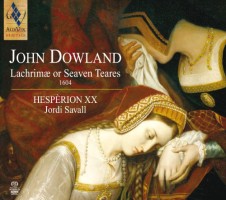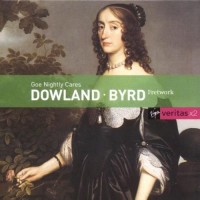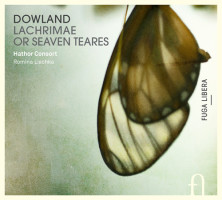Dowland’s Lachrimæ 1604: Update
|
Walt Mundkowsky [August 2014.]
John DOWLAND: Lachrimæ or Seaven Teares 1604. Hespèrion XX: Jordi Savall, Christophe Coin, Sergi Casademunt, Lorenz Duftschmid, Paolo Pandolfo (viols), José Miguel Moreno (lute). AliaVox HERITAGE AVSA9901 (1 Hybrid SACD) (http://www.alia-vox.com/). Distributed in the US by Harmonia Mundi (http://www.harmoniamundi.com/). I’ve perhaps touted Lachrimæ 1604 too often. Here’s Alex Ross from 2004 – “As a pseudo-tragic twentysomething living in Berkeley in 1990 and 1991, I used to listen for days on end to the Lachrimae of John Dowland. Jordi Savall’s recording, devastating to a fault, is the saddest hour of sound I know. Even the dances have a morbid air, a whiff of Jacobean death. I find this music hard to listen to now – it’s like re-reading certain drunken late-night letters I never mailed.” (The Rest Is Noise, Epiphany #17) Savall’s disc last appeared a decade ago in a five-CD Astrée brick called pieces for the viols. I have no interest in the new SACD layer (as I’m headphones-only), but the notes are more expansively laid out. So is the sound, at the top and bottom; Moreno’s lute also gains a bit in transient attack. Honestly, I still like Michel Bernstein’s original 1987 production, which keeps definition and richness in equilibrium. (Old favorites tend to linger as ghosts.) It’s tough to isolate Savall’s achievement from Fretwork’s different-but-equal take (think of Arrau and Kempff in Beethoven sonatas). Except for a 2002 moment of sense, Virgin has put the English group’s seven Lachrimæ and the 14 dances on separate CDs.
John DOWLAND: Lachrimae or Seaven Teares (1604). Hathor Consort: Romina Lischka (dir.), Liam Fennelly, Thomas Baeté, Anne Bernard, Benoît Vanden Bemden (viols), Sofie Vanden Eynde (lute). Fuga Libera FUG718 (1 CD) (http://www.outhere-music.com/en). Distributed in the US by Naxos (http://www.naxos.com/). Curiously, this is the Hathor Consort’s debut on disc. (Quartets don’t typically open with Haydn’s Seven Last Words either.) Director Lischka calls Anthony Rooley’s influence crucial – he led the first recording with the original scoring, in 1976. The Fuga Libera’s notes delve into Renaissance melancholy (this essay naturally goes deeper). I touched on the Corpus Hermeticum here. This is a fine account. The tuning is spot-on (the dissonances sting) and the part writing admirably clarified. The seven Lachrimæ are presented in a row, which I prefer to help comparisons, though some turns of phrase I anticipate are glossed over. (Also, the lute is too reticent.) Order of the remaining items is left to the players’ discretion. Several highlights – The King of Denmarks Galiard gets incision and snap, both welcome. Sir Henry Umptons Funerall always stands out from the surrounding dances. Here it is molded with great beauty. Dedicated to a famed pirate, Captaine Piper his Galliard never fails. How Christian IV of Denmark felt about that is not known. It began life as the song “If my complaints.” Lischka & Co. choose the signature piece Semper Dowland semper Dolens for their “goodnight.” The lute is more prominent, and the 7:05 duration maintains its grip. Timings – Savall, 70:54; Fretwork, 60:03; Hathor Consort, 67:57. * * * equipment Bryston BCD-1 player (2008, discontinued)
[More Walt Mundkowsky]
[More
Dowland]
[Previous Article:
Used Bin Troll Tweets I.]
[Next Article:
Armchair Operas and Amusements 10.]
|


